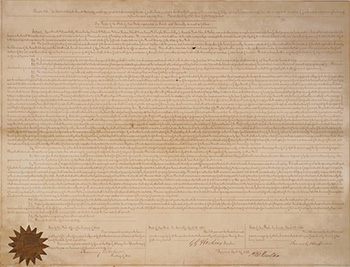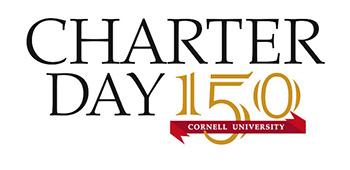CHARTER DAY
Charter Day Weekend
Charter Day Weekend: It will be a multi-day, on-campus, around-the-globe celebration of Cornell's beginning.
On April 27, 1865, the governor of New York, Reuben Fenton, signed into law Cornell University's charter, with members of the board of trustees holding their first meeting in Albany the next day. Not long afterward in Ithaca, Ezra Cornell, his son Alonzo Cornell, Andrew Dickson White and trustee Francis Finch walked together along a ridge overlooking the Cayuga Lake valley, evaluating the lay of the land for a prime spot to erect the university's first buildings.
Now, 150 years later, over the weekend of April 24-27, the signing of that charter will be celebrated at more than two dozen events on the Ithaca campus and approximately 60 events around the world, from Oregon to Australia.
A complete listing of campus events, times and locations:
http://150.cornell.edu/events/charterday/weekend-events
What's in the Charter?
Of the 10 charter trustees in Section 1, two besides Ezra Cornell would became long-standing supporters of the university with buildings bearing their names: John McGraw and Hiram Sibley. Horace Greeley, a former U.S. Congressman and editor of the New-York Tribune, was also among the charter trustees.
Nonsectarianism was built into Cornell's founding document: "at no time shall the majority of the board be of any one religious sect, or of no religious sect." The charter later states "persons of every religious denomination, or of no religious denomination, shall be equally eligible to all offices and appointments." As in the motto, "persons" is used instead of "men."

Cornell University Charter. Division of Rare and Manuscript Collections. See larger image
The Cornell library was Ithaca's public library, given to the community by Ezra Cornell in 1863.
Section 2 also names as a trustee "the eldest male lineal descendant of Ezra Cornell." That position is held by Ezra Cornell '70; the word "male" was removed in 1983 to pave the way for his eldest daughter, Katy Cornell '02.
Section 4 defines the goals of Cornell "to teach such branches of learning as are related to agriculture and the mechanic arts, including military tactics, in order to promote the liberal and practical education of the industrial classes in the several pursuits and professions in life." But other sciences and knowledge may be taught "pertaining to the university as the trustees may deem useful and proper," leaving flexibility for programs in fields like hotel administration and labor relations.
Section 9 affirms Cornell's commitment to economic diversity, stating that the university would be open to anyone "without distinction as to rank, class, previous occupation or locality."
Gov. Reuben Fenton signed the charter on April 27, 1865, marking the founding of Cornell University. Fenton was scheduled to speak at Cornell's opening in 1868 but left town early, fearing criticism for his support of the controversial new university. Andrew Dickson White noted in his program that "Gov. Fenton was afraid of Methodists & Baptists & other sectarian enemies of the University & levanted the night before – leaving the duty to Lieut. Gov. Woodford who discharged the duties admirably."
